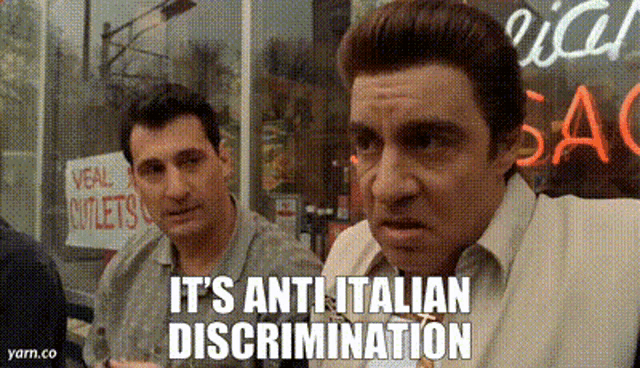High-profile killing of UnitedHealthcare CEO in New York
- Thread starter VorZakone
- Start date
You are using an out of date browser. It may not display this or other websites correctly.
You should upgrade or use an alternative browser.
You should upgrade or use an alternative browser.
So this guy sets up a pretty smooth murder, goes to another state and acts like Ralph Wiggum? 

Good, I was worried that it may have been for a more selfish reason.
George Owen
LEAVE THE SFW THREAD ALONE!!1!
answer to second question is yes, or at least public companies supplying materials to such security firms
I would look into companies working on developing the sentry gun technology.
Rich countries and rich communities have already started building the walls to separate themselves. Sentry guns are coming next.
Brophs
The One and Only
- Joined
- Nov 28, 2006
- Messages
- 52,399
VorZakone
What would Kenny G do?
- Joined
- May 9, 2013
- Messages
- 37,945
diarm
Full Member
- Joined
- Jul 13, 2014
- Messages
- 18,742
Bit random but I got taxi with someone whose daughter is a detective in the Dublin police force (Criminal Assets force). Stuff I learned. She didn't need any additional qualifications before getting the job. They basically just recruit the best/smartest police from the "regular" force. She has a gun in her house and it's not in a safe. She has to park her car with the rear to the road, as the quickest way to spot an unmarked police car is the fact they don't have insurance discs on the windscreen.
Why wouldn't they just have insurance discs in that case?
VorZakone
What would Kenny G do?
- Joined
- May 9, 2013
- Messages
- 37,945
https://nypost.com/2024/12/09/us-ne...d-as-luigi-mangione-an-ex-ivy-league-student/Mangione has subscribed to anti-capitalist and climate-change causes in addition to showing he despises the healthcare industry in the country, according to law-enforcement sources, citing online activity gleaned by authorities.
On the Goodreads website, Mangione’s account shows quotes he particularly likes ranging from Socrates to Bruce Lee — to wacky anti-establishment Ted Kaczynski, the infamous “Unabomber’’ who terrorized the country for nearly two decades by planting deadly bombs before he was nabbed in 1996.
Pogue Mahone
Clarkson
Why wouldn't they just have insurance discs in that case?
I have no idea. Maybe cops need a way to recognise unmarked cop cars?
Sweet Square
ˈkämyənəst
Oh that settles it. Execute this extremist at once.
Suedesi
Full Member
Health insurances and their CEOs aren't symptoms of the system. They are engineers and benefactors of the system, they lobby and bribe to maintain/improve the system with the only goal to make more money.
It's absolutely asinine to suggest that they are "only a symptom".
Your concerns are valid, but it’s important to separate individual accountability from systemic issues. CEOs should absolutely be held responsible for fraud or negligence, but managing a health insurance company in a heavily regulated, low-margin industry isn’t inherently unethical—it’s operating within a flawed system. Health insurers typically spend 85-90% of premiums on healthcare (due to regulations like the Medical Loss Ratio), leaving profits in the single digits. This isn’t the profiteering we see in high-margin insurances like title or reinsurance.
Do insurers lobby to protect their interests? Absolutely—like every major industry. But labeling them as the "engineers" of the system overlooks the fact that they operate within a framework largely dictated by government policies and market dynamics. The reality is more symbiotic: insurers adapt to and influence the system, but they don't act as sole architects. Blaming insurers alone oversimplifies the problem and distracts from the broader systemic issues. Real reform requires addressing the entire ecosystem, including providers, pharmaceutical companies, and policymakers—not just one piece of the puzzle.
That said, I can’t muster much sympathy for the CEO. Murder is wrong, but when someone profits by denying care and perpetuating a broken system, it’s hard to feel bad for them.
Your concerns are valid, but it’s important to separate individual accountability from systemic issues. CEOs should absolutely be held responsible for fraud or negligence, but managing a health insurance company in a heavily regulated, low-margin industry isn’t inherently unethical—it’s operating within a flawed system. Health insurers typically spend 85-90% of premiums on healthcare (due to regulations like the Medical Loss Ratio), leaving profits in the single digits. This isn’t the profiteering we see in high-margin insurances like title or reinsurance.
Do insurers lobby to protect their interests? Absolutely—like every major industry. But labeling them as the "engineers" of the system overlooks the fact that they operate within a framework largely dictated by government policies and market dynamics. The reality is more symbiotic: insurers adapt to and influence the system, but they don't act as sole architects. Blaming insurers alone oversimplifies the problem and distracts from the broader systemic issues. Real reform requires addressing the entire ecosystem, including providers, pharmaceutical companies, and policymakers—not just one piece of the puzzle.
That said, I can’t muster much sympathy for the CEO. Murder is wrong, but when someone profits by denying care and perpetuating a broken system, it’s hard to feel bad for them.
The industry and its practices are absolutely unethical and those practices are mandated by the executives at the head of these companies. It is asinine to pretend that this system exist without the direct actions of its leaders.
That CEO is utter scum as are every single one of his peer.
Pogue Mahone
Clarkson
So 5 days total, to track down and apprehend this guy after whacking someone in the middle of a city of 8 million people. In disguise. Chief Wiggins really upping his game.
Suedesi
Full Member
time for stage two of his plan
mobilise the masses!
I honestly think he should take his chances with a jury of his peers. The worst outcome possible would be to die in a firefight with the police.
Brophs
The One and Only
- Joined
- Nov 28, 2006
- Messages
- 52,399
-I never leave home with my fake ID, my manifesto and my murder weapon.
-Your what?
-My weapon. Just a normal, regular weapon.
-Your what?
-My weapon. Just a normal, regular weapon.
HTG
Full Member
- Joined
- Apr 27, 2011
- Messages
- 7,782
- Supports
- Bayern
Who?So 5 days total, to track down and apprehend this guy after whacking someone in the middle of a city of 8 million people. In disguise. Chief Wiggins really upping his game.
Mike Smalling
Full Member
- Joined
- Jan 27, 2018
- Messages
- 15,118
Pickle85
Full Member
- Joined
- Mar 15, 2021
- Messages
- 8,212
Suspect named as Luigi Mangione?
https://nypost.com/2024/12/09/us-ne...d-as-luigi-mangione-an-ex-ivy-league-student/
https://nypost.com/2024/12/09/us-ne...d-as-luigi-mangione-an-ex-ivy-league-student/
Beans
Full Member
So the assassin is a Martin Scorsese characterSuspect named as Luigi Mangione?
https://nypost.com/2024/12/09/us-ne...d-as-luigi-mangione-an-ex-ivy-league-student/
Pickle85
Full Member
- Joined
- Mar 15, 2021
- Messages
- 8,212
And spoiler alert...he was hot too. Can see him being played by a rehabilitated James Franco (hopefully not really as Franco is a creep but just looks like him) in the film.So the assassin is a Martin Scorsese character
Suedesi
Full Member
The industry and its practices are absolutely unethical and those practices are mandated by the executives at the head of these companies. It is asinine to pretend that this system exist without the direct actions of its leaders.
That CEO is utter scum as are every single one of his peer.
Oh, right - because this exec single-handedly crafted the entire healthcare system from his villainous lair. Of course, forget the regulators setting the rules, the pharma cos inflating prices, hospitals charging astronomical fees, and policymakers tangled in the lobbyists webs. No, it’s definitely all the fault of that one “utter scum” CEO and their dastardly peers.
It's way more nuanced than that, but I guess why wrestle with reality when you can reduce everything to a few cartoon villains.
Oh, right - because this exec single-handedly crafted the entire healthcare system from his villainous lair. Of course, forget the regulators setting the rules, the pharma cos inflating prices, hospitals charging astronomical fees, and policymakers tangled in the lobbyists webs. No, it’s definitely all the fault of that one “utter scum” CEO and their dastardly peers.
It's way more nuanced than that, but I guess why wrestle with reality when you can reduce everything to a few cartoon villains.
Who said that he was the only one doing anything, at which point did I make that claim?
Mike Smalling
Full Member
- Joined
- Jan 27, 2018
- Messages
- 15,118
Perfect logic for hiding from the police. Ditch the backpack, but definitely keep the murder weapon and fake ID used. Also, make sure to have a printed version of your manifesto detailing your motive.
I don't know, seems a bit strange to me.
I don't know, seems a bit strange to me.
Wumminator
The Qatar Pounder
So 5 days total, to track down and apprehend this guy after whacking someone in the middle of a city of 8 million people. In disguise. Chief Wiggins really upping his game.
Ffs.
Jake Gyllenhaal surely ?And spoiler alert...he was hot too. Can see him being played by a rehabilitated James Franco (hopefully not really as Franco is a creep but just looks like him) in the film.
George Owen
LEAVE THE SFW THREAD ALONE!!1!
Let's hope his sacrifice was the start of change in the system.
And I say sacrifice because the kid could have just go on enjoying his privileged life.
You are arguing against a position nobody has taken. Well done.Oh, right - because this exec single-handedly crafted the entire healthcare system from his villainous lair. Of course, forget the regulators setting the rules, the pharma cos inflating prices, hospitals charging astronomical fees, and policymakers tangled in the lobbyists webs. No, it’s definitely all the fault of that one “utter scum” CEO and their dastardly peers.
It's way more nuanced than that, but I guess why wrestle with reality when you can reduce everything to a few cartoon villains.
Brophs
The One and Only
- Joined
- Nov 28, 2006
- Messages
- 52,399
Hates capitalism. Gets apprehended in a McDonalds.
Mike Smalling
Full Member
- Joined
- Jan 27, 2018
- Messages
- 15,118
Timothée Chalamet. So hot right now.Jake Gyllenhaal surely ?
Fergies Gum
Full Member
- Joined
- May 23, 2011
- Messages
- 13,891
Dude was smart enough to build a ghost gun and stay hidden for days but then forgot to destroy the weapon/fake id document. Almost like he wanted to eventually get caught.
Suedesi
Full Member
Yeah, is this the same guy who elaborately planned a murder? He’s now a doofus?-I never leave home with my fake ID, my manifesto and my murder weapon.
-Your what?
-My weapon. Just a normal, regular weapon.
MTF
Full Member
It's obviously the assisted living facilities breeding all of these killers. The trump shooter also worked at one, iirc.His LinkedIn page indicates that he once worked in an assisted-living facility for the elderly for a few months in 2014, while still in high school.
Hates capitalism. Gets apprehended in a McDonalds.
It's cheap dude, eating fair trade organic shit can only be afforded by arch capitalists.
Timothée Chalamet. So hot right now.
Yes, you're right, Jake was the youngest actor my old brain could think of.
I have no idea. Maybe cops need a way to recognise unmarked cop cars?
ANPR....
Suspect named as Luigi Mangione?
https://nypost.com/2024/12/09/us-ne...d-as-luigi-mangione-an-ex-ivy-league-student/

Share:

 Banter era CEO slaying.
Banter era CEO slaying.